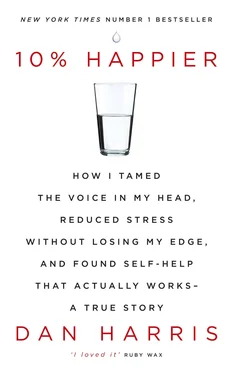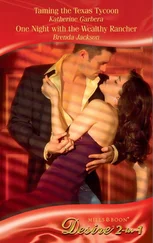He would go like this:
Zig: a spot-on diagnosis of the human condition.
Zag: a bizarre, pseudoscientific assertion.
Zig: a profound insight into how we make ourselves miserable.
Zag: a claim that he once lived on park benches for two years in a state of bliss.
He said he had a way for me to be happier, too, and despite the fog of folderol, I half suspected he actually might be right.
Weeks before I first heard the name Eckhart Tolle, I was staring, unhappily, in the mirror of an airplane bathroom. I was on my way home from shooting a Nightline story in Brazil, where we’d spent a week living with an isolated Amazon tribe. It had been amazing. These people still lived exactly as their ancestors had in the Stone Age. They’d barely met any outsiders. They let my producer and me sleep in hammocks in their huts. I returned the favor by entertaining them with my video iPod. Leaning over the metallic counter in this lavatory, I was neither savoring the incredible experience I had just had nor strategizing about how to write my story, which was set to air a few weeks hence. Instead, I had my forelock pushed back and was scrutinizing a hairline that seemed to me about as stable as the Maginot Line.
Bianca had busted me doing this on more than one occasion in our bathroom at home. She pointed out that, other than some thinning in the back and a receding divot near my part, I basically had a full head of hair. But every now and again, a stray glance in a reflective surface would send me down the rabbit hole. Here in this cramped airplane bathroom, I was flashing on a future that looked like this:
Baldness → Unemployment → Flophouse in Duluth
Inevitably, this led to a nasty rejoinder from some other, more reasonable part of my brain:
Get over yourself, Harris.
When I brought the hair thing up with Dr. Brotman, he leaned back in his chair and beamed skepticism at me from across his desk.
“You don’t understand,” I said to him. “If I go bald, my career is screwed.”
“ You don’t understand,” he replied, eyeing my hairline. “You’re not going bald.”
By any rational measure, things were otherwise going extremely well in my life. Nearly three years had passed since my panic attacks. I was off the Klonopin and down to seeing Brotman only once a month or so. Occasionally I’d be ambushed by waves of longing for drugs, but the cravings were vastly diminished. (Although I tried to always keep in mind something a friend had once told me: “Your demons may have been ejected from the building, but they’re out in the parking lot, doing push-ups.”) At home, the situation was even better: after living together for more than a year, Bianca and I had gotten engaged and were planning a wedding in the Bahamas. At work, my gig anchoring the Sunday edition of World News continued to be a joy. And even though public interest in the wars in Iraq and Afghanistan was on the wane, a new opportunity had emerged. The post-Koppel Nightline had moved away from live interviews and more toward lengthy taped stories from all over the world. The producers had allowed me to launch major investigations, such as tracking rhino poachers in Nepal, and posing as a customer in order to expose child slave traders in Haiti. This was a new type of reporting for me. It had a crusading spirit. Corny or not, I found that old journalistic injunction to “comfort the afflicted and afflict the comfortable” inspiring.
Nevertheless, my worrying over work had grown worse, and the hair issue was just the leading indicator. Increasingly, I was waking up to the fact that the whole industry rested on such an uncertain foundation. In my eight years at the network, I had witnessed seemingly immovable fixtures of broadcast news fade or simply disappear. Among the missing were Peter Jennings, Tom Brokaw, and Dan Rather. When I had arrived at ABC News back in 2000, I was the youngest correspondent on the fourth floor. Suddenly, at age thirty-seven, I was nearly the oldest. All but one of those more senior correspondents had departed, often unceremoniously. These were guys who had given their lives to a profession that could be lavishly kind or capriciously cruel. I’d seen so many careers soar or sour based on seemingly random things, such as changing physical appearance, the personal whim of a specific anchor or executive, or the emergence of a more eye-catching rival. In discussing the unpredictability of my profession with my brother recently, he told me about scientific studies where lab rats were rewarded with food pellets at random, illogical times. Those rats went crazy.
To make matters worse, the country was in the most severe recession since the Great Depression. Bear Stearns had just collapsed, along with Lehman Brothers. The stock market was in free fall. It felt like the world had gone off a cliff no one had seen coming. ABC News went through a wrenching round of layoffs. While my job seemed safe at the moment, I felt bad for my colleagues and fretted about the future. When I thought about alternative careers, I drew a blank. What other marketable skills did I have besides wearing makeup and bellowing into cameras? This was a bit maudlin, but there were a few times where I found myself lying on the couch in my office, staring at a picture on my wall of the ocean, thinking about the word impermanence .
On one such occasion there was a knock on my door. It was David Muir popping by to chat. We had a lot in common. We’d both worked in local news in Boston, arrived at the network before the age of thirty, and loved to travel the planet doing stories. Just a couple months earlier, David had filed some amazing reports from Chernobyl. He had the office down the hall from me and we’d sometimes get together to talk about our latest stories—or just gossip. In the spirit of misery looking for company, I asked him what he would do if the whole TV news business imploded. He shrugged his shoulders with enviable insouciance and said, “Eh, I’d find something else.”
Back in the toilet on the airplane coming home from Brazil, I replayed that scene in my mind as I continued to stare at my faltering hairline.
Easy for you to say, Muir—with your full head of hair.
I’d been in this position in front of the mirror for at least ten minutes. I realized, with a twinge of embarrassment, that there was probably a line outside by now. I let my hair fall back down onto my forehead and returned, sheepishly, to my seat.
About a month later, on a sunny Saturday in September, I was at a block party in New Jersey. There was a cookout, a bounce castle for the kids, and a band with a bassist wearing a do-rag. When the music stopped, a pastor took the mic and declared, with his voice echoing off the brightly colored vinyl siding of the surrounding row houses, “There’s room for everyone at the cross today.”
I was here for a story about Sarah Palin, recently plucked from obscurity to become John McCain’s running mate. A video had just hit the web showing Palin praying for God’s help to get a gas pipeline built in her home state of Alaska. That had sparked a lot of discussion about the fact that she was a Pentecostal, a strain of Christianity sometimes described as “Evangelicalism on steroids.” I wanted to do a piece that would explain to viewers exactly what Pentecostals believed. The closest church was here in Jersey City, and they just happened to be throwing a party.
To be away from the noise, our cameraman, soundman, and producer had set up for the interviews a little farther down the street. The three of them were in the middle of an animated discussion led by Felicia, the producer, a petite, apple-cheeked mother of two with whom I’d worked for many years. She was telling the others about a book she’d just read by someone named Eckhart Tolle. As I approached, she turned toward me: “Have you read him? You might like him. It’s all about controlling your ego.”
Читать дальше












